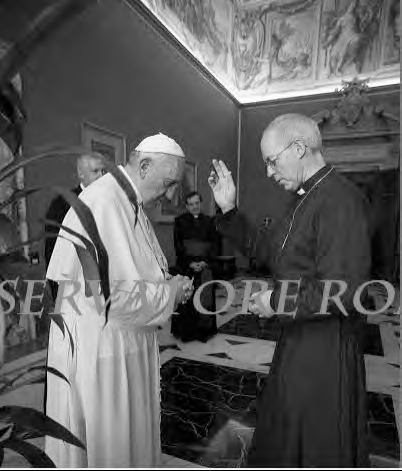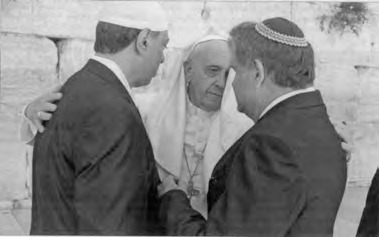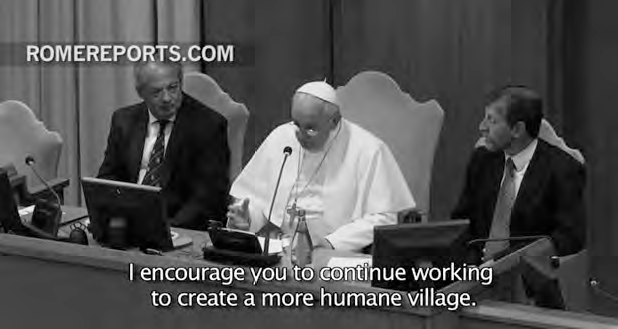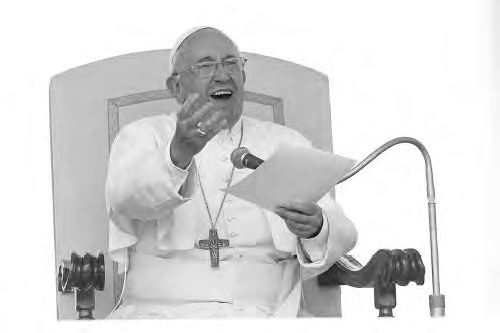News of occupied Rome
In the traditional world the suspicion seems to be circulating: You criticize the Pope, therefore you are sedevacantists, or at least you are beginning to become one. We reply by citing an author who is not suspected of being a sedevacantist:
Some, to put us down, accuse us of being overly traditional or even sedevacantist. Well, I’m not a sedevacantist; we are not sedevacantists, because sedevacantism destroys the visibility of the Catholic Church. The Catholic Church is visibly recognizable by its exterior characteristics, She is always One, Catholic, Apostolic and Roman. The Catholic Church is visible because She is not a purely spiritual entity, She is not simply a gathering of persons who think alike, nor a movement of ideas or a school of thought but a true society having a juridical structure having a hierarchy coming from living men with a Head recognized by all, as in other human societies. This Head is the reigning Pontiff Pope Francis, in whom we recognize the Vicar of Christ. But we know that, precisely because the Church is a visible institution, we must always make a distinction between the Church and the men of the Church: The Church is always visible, infallible and indestructible, immaculate, in faith and morals; men of the Church are not all and are not always impeccable nor infallible. Even the Pope may be respectfully criticized. The Pope is not Jesus-Christ nor His successor: he is His Vicar, but it is Jesus-Christ who holds and governs the Church 1.
The Pope asks the blessing of a heretic
Pope Francis received, on June 14, the new Anglican “Archbishop” of Canterbury, Justin Welby, who was wearing

the episcopal ring offered to the “Archbishop” Ramsey by Paul VI. The Pope took advantage of the opportunity in order to ask to be “blessed” by this heretic, who is nothing but a simple layman because Anglican orders are not valid.
But that shouldn’t shock us if we recall that Benedict XVI allowed himself to be blessed by a Rabbi:
« At the end of an [inter-religious] encounter [at the Monastery of Saint Benedict in Sao Paulo on May 11, 2007], Rabbi Henry Sobel, 63 years old,
from the Jewish Congregation of Sao Paulo, declared: “The Pope [Benedict XVI] is a friend of the Jewish people”. […] The Rabbi explained that after having asked “very humbly” for the Pope’s blessing, the Pope, having given it, then accepted in his turn to receive a blessing from him. » (Zenit.org, May 11, 2007.)
The recipe of happiness for Francis
« What is the recipe for happiness? »
In answer to this question asked by the Argentinean journalist Pablo Calvo on July 7, the Pope reflected a moment, and then became animated. Visibly relaxed, he delivered in 10 points his “recipe for happiness”:
1. Live and let live:
« The Romans have a saying that we can take as a theme which goes “Go ahead, and let the others go ahead”. Live and let live, it’s the first step towards peace and happiness. »
2. Give yourself to others:
« Those who are isolated run the risk of becoming selfish. And stagnant water is the first to become corrupted. »
3. Be animated with kindness and humility:
« In “Don Segundo Sombra” (an Argentinean novel by Ricardo Guiraldes), the hero tells how, young, he was like a waterfall off a mountain which rushes over everything; become an adult, he was like a river which went ahead then, as an older man, that he advanced, but slowly, as if canalized. I use this image of the poet and novelist Ricardo Guiraldes, this last adjective, canalized. The capacity to move yourself with kindness and humility. The elderly have this wisdom; they are the memory of a people. And a nation that cares not for its elderly doesn’t have a future. »
4. Play with children:
«Consumerism has led us to the anguish of losing a healthy culture of pleasure: read, enjoy art…Today, I don’t hear many confessions, but in Buenos Aires, I heard the confessions of a lot of people and I asked the young mothers who came, “How many children do you have? Do you play with them?” It was an unexpected question, but it’s a way of saying that children are the key to a healthy culture. It’s difficult for parents who go to work early and come home when their children are sleeping. It’s difficult, but it must be done. »
5. Spend Sunday with the family:
« The other day, at Campobasso, I encountered University students and people from the workforce and, to each I reminded them that we don’t work on Sunday. Sunday is for the family. »
6. Help the young to find work:
« We should be creative with this part of the population. Because of a lack of opportunities, they can end up falling into drugs. And the amount of suicides is very high among the young without work. The other day I read, but I’m not sure it’s a scientific fact, that there are 75 million young people under the age of 25 who have no work. And it doesn’t suffice to just feed them: we must make up for them classes of one year to become plumbers, electricians, tailors and seamstresses… It’s dignity that will help them bring food to the table. »
7. Take care of the world we live in:
« We must take care of creation, and we don’t. It’s one of our greatest challenges. »
8. Rapidly forget whatever is negative:
« The need to speak ill of others is a mark of having little esteem for oneself. That’s like saying that I feel so bad, that instead of lifting myself up, I put others down. It is healthy to speedily forget whatever is negative. »
9. Respect those who think differently:
« One can go all the way to witnessing with another, as long as both make progress in this dialogue. But there’s nothing worse than religious proselytizing, one that paralyzes: “I dialogue with you to convince you”. No. Each one dialogues according to who they are. The Church grows by its attractiveness, not by proselytizing. »
10. Actively seek peace:
« We are living in a time where wars are numerous. […] War destroys. The call to peace needs to be cried out. Sometimes the word “peace” brings to mind the idea of “calm”, but peace is never tranquillity: it is always an active peace. »
God is not even mentioned. It used to be, in illo tempore, that joy was a fruit of the Holy Ghost (Gal. 5, 22), but for the Pope, one has no need of the faith, nor of Our Savior Jesus Christ, to be happy!
Prayer for peace « was absolutely not a failure »

On May 29, the Pope, Rabbi Skorka and the Imam Abu (friends of the Pope who accompanied him during his whole trip in Israel) gave each other the accolade in front of the “Temple Wall” under the amused eyes of Jewish journalists who qualified the trio “the Holy Trinity”! The rest of the story takes place on June 8: in the gardens of the Vatican, the Pope, together with the Jewish and Palestinian Presidents “prayed for Peace”; the Muslim Representative, departing from the prepared text of his prayer, asked his “Master” (in Arabic): « Grant us the victory over the infidel people ». Two days later, Mossoul fell into the hands of the Muslims who then massacred the Christians. And ever since then, the blood of Christians flows in the Middle East: we see children decapitated, adults crucified, etc.
Without doubt God did not directly answer the prayer of the Imam, but He could have permitted this triumph of Islam to punish our sins, and especially the horrible apostasy of the Conciliar Church who presents Islam as if it were a respectable religion while it is nothing but an intellectual imposture (a tissue of contradictions) which imposes itself by violence2.
But the prayer for peace in the Holy Land « was absolutely not a failure », affirmed tranquilly Pope Francis on August 18 in the plane returning from Korea:
— « Holy Father, seeing the war in Gaza, wasn’t the prayer for peace organized at the Vatican last June 8th a failure according to you? »
— « Thank you, thank you for the question. This prayer for peace was absolutely not a failure. Firstly, the initiative didn’t come from me: the initiative of praying together came from the two Presidents, from the President of the State of Israel and from the President of the State of Palestine. […] These two men are men of peace, they are men who believe in God, and who have lived through so many horrible things, so many horrible things that they are convinced that the only way to resolve this story is through negotiation, dialogue and peace. But now for your question: wasn’t it a failure? No, I believe that the door is open. […] The door of prayer was opened. One says: “we must pray”. It’s a gift, peace is a gift, a gift which is merited by our work, but it’s a gift. And tell mankind that with the way of negotiation – which is important, of dialogue – which is important, there is also that of prayer. It’s true. Afterwards came what came. But that is circumstantial. On the other hand, our meeting was not [just] a circumstance. It is a fundamental step of human behavior: prayer. Now the smoke of bombs, the wars, don’t allow us to see the door, but the door remains open from now on. And as I believe in God, I believe that the Lord sees this door, and He sees all those who pray and all those who ask Him to help us. Yes, I love this question. Thank you, thank you for having posed it. Thank you3. »
Errare humanum est, persevare diabolicum. How much time will it take before the hierarchy of the Church realizes the Utopia of Conciliar ecumenism? And how long will God permit the infiltration of the hierarchy by the Masonic Lodges?
Construct an authentic brotherhood among people
We know that Tertullian said that the blood of martyrs is the seed of Christians. As for the Pope, after the assassination of three religious of Burundi on September 7th, he hopes that « the blood spilled would become the seed of hope to construct an authentic brotherhood among people ».
Since the last Council, the Vatican actively works at the construction of this “brotherhood”. As for Pope Francis, he established in Buenos Aires, while he was Archbishop there, a scholastic inter-religious and multi-cultured network of cultural integration called “Scholas Occurrentes”. On September 4, the Pope explained to the delegates of the Scholas Occurrentes the reason for this network: to organize inter-religious football matches, to combat the unemployment of the young, to promote the “culture of encounter”, to struggle against “discrimination”, to promote dialogue between religions, to create a “human village” that brings peace and hope: « Sports saves us from selfishness; […] let us walk through life together; […] the young must build the future; […] let us build bridges, not walls; […] let us share our experiences; […] let us enter into the spontaneity of life”, etc. »
This project has nothing specifically Christian about it, it is naturalistic (without reference to the supernatural end of man) and won’t displease the “brethren” [i.e. the Masons]. Indeed, we know that the end of Freemasonry is the “reconstruction of the Temple”, that is to say, to rebuild all humanity under a “universal republic” with no reference to the supernatural end of man, nor to Our Lord Jesus Christ.
The “United Nations” of religions

The project of the Pope is in perfect harmony with those of the other leaders of the contemporary world. It is thus that the former Spanish President Jose Luis Rodriguez Zapatero proposed on July 15, at the time of the international symposium on World Peace at the University of Nebrija of Madrid, the creation of a “permanent alliance between religious denominations” joined to the “Alliance of civilizations” (one of his creations) and to the United Nations.
As for Shimon Peres, the former President of Israel, he met the Pope again on September 4, 2014 and suggested an “Organization of the United Nations of religions” to fight against all violence perpetrated in the name of the faith. « The Pope didn’t engage himself personally, but listened carefully and expressed his respect for this initiative, assuring him of the attention of the Dicasteries of the Roman Curia concerned – the Pontifical Counsel for inter-religious dialogue and the Pontifical Counsel Justice and Peace », specified Father Lombardi.
Evangelical Christians: The Pope has gone to find his brothers
On August 12, 2014, Pope Francis affirmed: « the Pope has gone to find his brothers! », while visiting an Evangelical [= Protestant] Community. He encourages them to walk « on the path of unity », in « searching for Jesus » because « when one walks in the Presence of God, one finds this brotherhood ».
Pope Francis gave a speech in which he indicated « the path of Christian holiness: every day, seek Jesus to encounter Him and every day allow yourself to be sought by Jesus and allow yourself to be found by Jesus ». Finally, the Pope asked pardon in the name of the Church for the persecutions perpetrated by Catholics against Evangelical Christians throughout the course of History: « Among those who wrote up these laws and persecuted, denounced our Pentecostal brothers because they were “enthusiastic” almost “mad”, there were some Catholics: I am the Pastor of the Catholics: I beg your pardon for what happened. I ask your pardon for these Catholic brothers and sisters who have not understood and who were tempted by the devil and did as the brothers of Joseph. I ask the Lord to give us the grace to acknowledge and to forgive…Thank you! »
The laws for which the Pope asks pardon are the laws which restrained the freedom of exercising a public cult of certain Evangelical sects in Italy, under Pope Pius XI. They were perfectly in accord with Catholic doctrine…before Vatican II.
1 — Roberto De Mattei in the “Courrier de Rome”, June 2014, p. 6. Roberto de Mattei presents himself as a disciple of professor Plinio Correa de Oliveira, Founder of the TFP (Work Family Property, see the “Sel de la terre” 28, p. 185; 39, p. 262 and 46, p. 266), which he frequented during about 20 years (1976-1995) and of which he wrote a biography. He directed the “Alleanza Cattolica”. He is president of the foundation “Lepanto” and he founded and directed the “centre culturel Lepante” (1982-2006). He writes regularly in the “Correspondance européenne”. He is now in the “Ecclesia Dei” movement, but that doesn’t keep him from participating in the “Courrier de Rome” congresses presided by Bishop Fellay (for example the next one, in January 2015). In the beginning of September 2014, he gave a conference during a Pilgrimage of the Society to Rome in front of an “audience of very interested Priests” (DICI #300, p. 10).
2 — See especially the works of Father Guy Pages (www.islam-et-verite.com <http://www.islam-et-verite.com/> ).
3 — Osservatore Romano en langue française, Thursday, August 21, 2014, n° 34, page 16.

